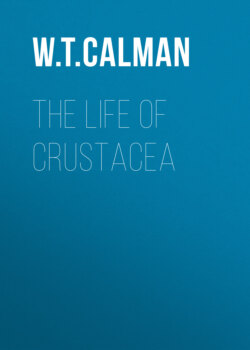Читать книгу The Life of Crustacea - W. T. Calman - Страница 5
На сайте Литреса книга снята с продажи.
FULL-PAGE PLATES
ОглавлениеTable of Contents
| PLATE | FACING PAGE | |||
| I. | Male and Female Lobsters, showing the Difference in the Relative Breadth of the Abdomen in the Two Sexes. This Figure also illustrates the Dissimilarity of the Large Claws, and the Fact that the "Crushing Claw" may be on either the Right or Left Side of the Body. (From Brit. Mus. Guide) | 26 | ||
| II. | Apus cancriformis from Kirkcudbrightshire. Slightly enlarged | 36 | ||
| III. | { | Group of Specimens of the Goose Barnacle (Lepas anatifera), One showing the Cirri extended as in Life. Natural Size. (From Brit. Mus. Guide) Group of a Common Species of Acorn-shell or Rock Barnacle (Balanus balanoides). Natural Size | } | 42 |
| IV. | Penæus caramote, from the Mediterranean. About Half Natural Size. (From Brit. Mus. Guide) | 57 | ||
| V. | The Common Spiny Lobster (Palinurus vulgaris). Much reduced. (From Brit. Mus. Guide) | 59 | ||
| VI. | Munida rugosa. British. Reduced | 60 | ||
| VII. | The Common Hermit Crab, Eupagurus bernhardus, in the Shell of a Whelk. Reduced. (From Brit. Mus. Guide) | 62 | ||
| VIII. | The "Northern Stone Crab," Lithodes maia. Much reduced. The Last Pair of Legs are folded out of Sight in the Gill Chambers. (From Brit. Mus. Guide) | 63 | ||
| IX. | { | The Common Shore Crab (Carcinus mænas). Reduced Dromia vulgaris, carrying on its Back a Mass of the Sponge, Clione celata. British. Reduced | } | 68 |
| X. | Calappa flammea. Brazil. Reduced | 72 | ||
| XI. | The Giant Japanese Crab, Macrocheira kæmpferi. Male. The Scale of the Figure is given by a Two-foot Rule placed below the Specimen. (From Brit. Mus. Guide) | 76 | ||
| XII. | Squilla mantis, from the Mediterranean. About One-half Natural Size. (From Brit. Mus. Guide | 82 | ||
| XIII. | { | A Swimming Crab, Portunus depurator. British. Reduced A Spider Crab, Maia squinado, dressed in Fragments of Weeds. British. Reduced | } | 96 |
| XIV. | { | Corystes cassivelaunus. Male (on Left) and Female (on Right). British. Reduced Albunea symnista, One of the Hippidea. Indian Seas. Reduced | } | 100 |
| XV. | { | Ocypode cursor. West Africa. Reduced Gelasimus tangeri. Male Above, Female Below. West Africa. Reduced | } | 104 |
| XVI. | A Deep-sea Hermit Crab, Parapagurus pilosimanus, sheltered by a Colony of Epizoanthus. From Deep Water off the West of Ireland. Slightly reduced | 124 | ||
| XVII. | A Deep-sea Prawn, Nematocarcinus undulatipes. Slightly reduced. (From Brit. Mus. Guide) | 128 | ||
| XVIII. | Bathynomus giganteus. About One-half Natural Size. (From Lankester's "Treatise on Zoology," after Milne-Edwards and Bouvier) | 131 | ||
| XIX. | { | Latreillia elegans, One of the Dromiacea which esembles a Spider Crab. From the Mediterranean. Natural Size The Gulf-weed Crab, Planes minutus. Slightly enlarged | } | 155 |
| XX. | { | The Murray River "Lobster," Astacopsis spinifer. New South Wales. Much reduced The Land Crayfish, Engæus cunicularis. Tasmania. Natural Size | } | 177 |
| XXI. | Palæmon jamaicensis. A Large Freshwater Prawn of the Family Palæmonidæ. West Indies. Much reduced | 179 | ||
| XXII. | Atya scabra. A Freshwater Prawn of the Family Atyidæ, West Indies. Reduced | 180 | ||
| XXIII. | { | The River Crab of Southern Europe, Potamon edule (or Telphusa fluviatilis). Reduced Sesarma chiragra. A Freshwater Crab of the Family Grapsidæ. From Brazil. Slightly reduced | } | 182 |
| XXIV. | Æglea lævis. South America. Natural Size | 184 | ||
| XXV. | The Blind Crayfish of the Mammoth Cave of Kentucky, Cambarus pellucidus. Natural Size | 186 | ||
| XXVI. | { | A West Indian Land Crab, Gecarcinus ruricola Reduced A Land Hermit Crab, Cœnobita rugosa. Reduced | } | 190 |
| XXVII. | The Coconut Crab, Birgus latro. Much reduced | 196 | ||
| XXVIII. | Group of Barnacles, Coronula diadema, on the Skin of a Whale. Japan. Reduced | 209 | ||
| XXIX. | { | Cymothoa œstrum. An Isopod Parasite of Fish. Slightly Enlarged Sacculina carcini attached under the Abdomen of a Common Shore Crab. Reduced | } | 220 |
| XXX. | The "Norway Lobster," Nephrops norvegicus. About One-third Natural Size. (From Brit. Mus. Guide) | 240 | ||
| XXXI. | The Common Edible Crab, Cancer pagurus. British. Much reduced | 248 | ||
| XXXII. | Piece of Timber From Ryde Pier, showing Damage caused by Limnoria AND Chelura. (From Brit. Mus. Guide) | 255 |
